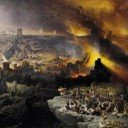1 Thes. 5:1 Now concerning the times and the seasons, brothers, you have no need to have anything written to you. [2] For you yourselves are fully aware that the day of the Lord will come like a thief in the night. [3] While people are saying, “There is peace and security,” then sudden destruction will come upon them as labor pains come upon a pregnant woman, and they will not escape.
As we continue our process of considering passages related to the rapture we now turn our attention to one of the more difficult passages. The difficulty lies in the fact that Paul tells the Thessalonians that they do not need any more information written to them regarding the times and seasons.
But boy, Paul, it would have really helped us!
But knowing what we have learned from other passages let us consider what information we do get from Paul in this passage. When he is referring to the “times and seasons” many immediately assume he is referring to the rapture and tribulation. But, once again, that is assuming the unproven and importing it into this passage.
Since we cannot be sure what previous lessons the Thessalonians may have received on the subject of times and seasons we can only make educated guesses. The best guess in my estimation is Paul is referring to the Olivet Discourse. This is coupled with other images Paul uses in the same passage including season, sudden destruction, labor pains, pregnancy and escape.
Paul also uses the term Day of the Lord, which will be dealt with in a post following our discussion of the Rapture Passage. Just note that tern Day of the Lord is a common one designating a time of destruction related to judgment. This passage is no different.
You will note that no where does Paul reference the Second Coming or rapture. Some have argued that later in this passage Paul mentions that his readers are not appointed to wrath and make the case that the Rapture will be a pre-tribulation or pre-wrath one. The problem is the context is clearly related to the wrath of God in relation to salvation.
1 Thess5:9 For God did not appoint us to suffer wrath but to receive salvation through our Lord Jesus Christ. 10He died for us so that, whether we are awake or asleep, we may live together with him. 11Therefore encourage one another and build each other up, just as in fact you are doing.
This is clearly discussing Jesus finished work on the cross that made Him our propitiation, taking on the wrath of God, so that God’s wrath is removed from His elect.
But getting back to actual verses at hand, please note that this whole passage is related to an event of judgment that is soon approaching. We know this because the Thessalonians were clearly familiar with the things to look (times and seasons) for in regards to this coming judgment. In fact, the concept of seasons is first heard in the Olivet Discourse when Jesus mentions that when you see the budding of the fig tree and all the trees you know that “summer” is near. The changing of the seasons is obvious and so will the events foretelling this coming destruction. This parallels the Olivet discourse.
Again note that this is a passage about destruction, not the birthing of a “kingdom of God” or the beginning of a New Heavens or New Earth. This is about a “sudden destruction” not a “sudden disappearance!”
Finally note that Paul mentions that this destruction would come when people were saying “peace, peace.” This matches perfectly the time before the destruction of Jerusalem as the armies drew back and the zealots thought they were winning and forcing the armies back. Also, the Romans sent several intermediaries bringing peace proposals. But then the frustration grew out of control and the onslaught began!
So, contextually this passage most likely refers to a soon coming judgment of which the Thessalonians would be familiar. This also makes sense giving what we know about the response letter of 2nd Thessalonians. They appeared to have more questions needing answers regarding the Day of the Lord and had received correspondence stating that day had passed. So, this Day of the Lord was event in the near future, but was not related to the Second Coming, Rapture or Resurrection.
At this point I usually get some exasperated sighs in the class. This is usually followed by: “Does the Bible talk about the Rapture anywhere in the Bible? What do we have to hope for?”
The first question has a definite “yes” for an answer and it will be found in the next couple posts.
The second question goes much deeper and will hopefull dealt with in much later posts.





No comments:
Post a Comment